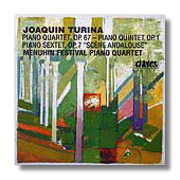
The Internet's Premier Classical Music Source
Related Links
- Turina Reviews
- Latest Reviews
- More Reviews
-
By Composer
-
Collections
DVD & Blu-ray
Books
Concert Reviews
Articles/Interviews
Software
Audio
Search Amazon
Recommended Links
Site News
 CD Review
CD Review
Joaquín Turina

Chamber Music
- Piano Quartet, Op. 67
- Piano Quintet, Op. 1
- Piano Sextet "Scène Andalouse", Op. 7
Menuhin Festival Quartet
Christina Busch, violin
Anna Barbara Duetschler, viola
Claves CD 50-9403 DDD 55:51
- Piano Quartet, Op. 67
- Piano Quintet, Op. 1
- Piano Sextet "Scène Andalouse", Op. 7
Christina Busch, violin
Anna Barbara Duetschler, viola
Claves CD 50-9403 DDD 55:51
It's always salutary to find you have to revise your opinion, and it has happened to me with the latest release in Claves' Turina cycle. I wasn't desperately impressed with Volume 1 (CD-50-9215), a motley collection of rather uninspiring orchestral pieces, limply played by the Orquestra Ciudad de Granada under Juan de Udaeta. Volume II has apparently been held up, and I haven't yet heard Volume III, so I sat down to Volume IV expecting to be charmed but ever-so-slightly bored, as had happened with that first instalment. From the very opening of the Piano Quartet, Op. 67, I knew it was going to be different this time.
I had been looking to those earlier pieces for confirmation of Georg-Albrecht Eckle's claim in the notes that Turina had penetrated to the essence of Andalusian music, that he sought 'to portray the "spirit", the atmosphere, the landscape, and the emotions of a culture'. All I heard, instead, was a sort of picture-postcard Spanishry – attractive enough, but hardly memorable. Now here's the proof that Eckle was right after all. The Piano Quartet, written in 1933 when Turina was 51, could not be anything but Spanish, but its gestures are pared down to the bone and the emotions understated in a way that shows Turina really now knew what he had to say. Instead of the mawkish sentimentality of, say, the Rapsodia Sinfónica, here is quiet but genuine passion, expressed, for example, in the unexpected stamp of a piano chord that suddenly enlivens the music. The string writing is often oblique, hesitant, atmospheric – and then it will tumble into a rapturous phrase that, for a moment, sets the pace rattling along again. Its dimensions are as modest as its tone is reserved: it's barely over a quarter-of-an-hour in length, although its language is so convincing that it strikes me as longer. This is easily the best piece of Turina I have yet come across and single-handedly it can sustain his reputation.
Quiet how far he had come is underlined by the two works it shares this disc with. The earlier of the two, the Piano Quintet of 1907, is overtly indebted to French models – hardly surprisingly, since Turina was studying with d'Indy in Paris at the time. It is an earnest and slightly impersonal work, more attractive than memorable, obviously by a Spaniard but one who wasn't too sure of his own personality. The two-movement Scène Andalouse, Op. 7, dates from 1912 and is scored for the unusual combination of solo viola and piano quintet. It's overt, unashamed programme music, intended to divert and delight. That it manages. Both works reveal that Turina's passage to the mastery of the Piano Quartet was a development from the rather obvious emotionalism of a Franck to the inspired obliquity of a Debussy.
The Menuhin Festival Piano Quartet may sound like an ad hoc group brought together for a one-off occasion but in truth it's a stable ensemble that has been playing since 1989. And they play extremely well, in textures often thin enough to expose insecurity. Instead, the tone is firm and the performances full-blooded and committed. They are matched in quality by the two musicians who join them in the early works, Christina Busch and Anna Barbara Dütschler, whom I suspect to be a scion of the house of Claves.
To my surprise, then, a release well worth investigation.
Copyright © 1996/1998, Martin Anderson


















